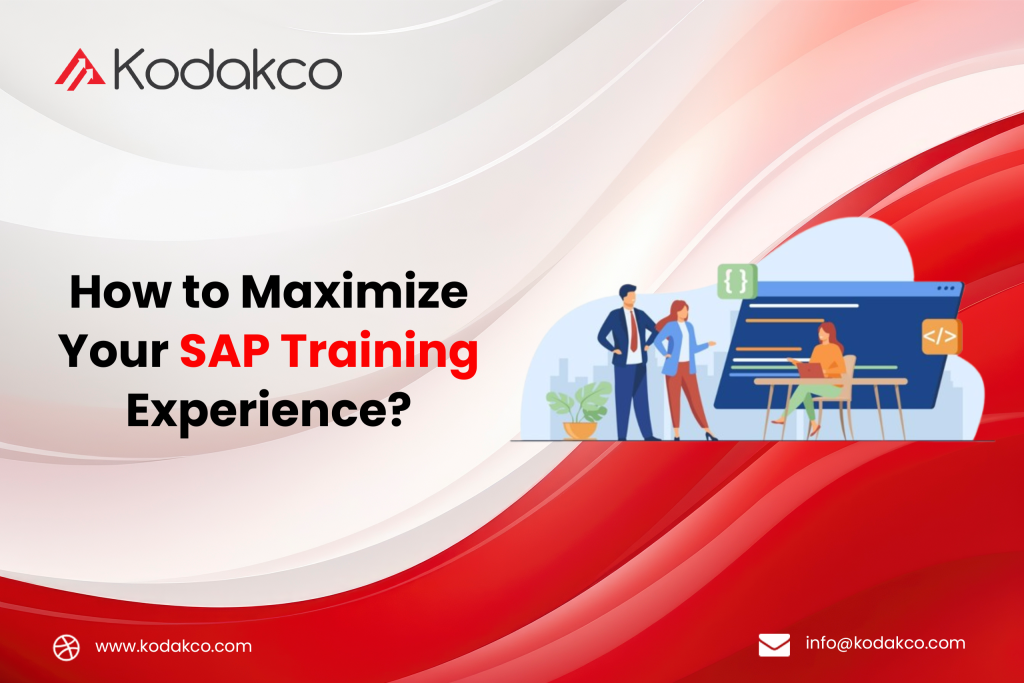Systems, Applications, and Products – SAP is one of the most widely used software programs that helps develop enterprise resource planning- ERP solutions. This software – SAP, is widely used by businesses worldwide for organizations to run themselves efficiently across finance, logistics, human resources, and more. SAP software supports various business functions, and SAP training helps users understand the software’s feasibility and techniques for effective use.
With companies across all domains adopting SAP, there is a demand for professionals who understand the capability of the software, know how to navigate, and utilize the software while working efficiently with the same. Whether you’re an aspiring consultant, a business analyst, or an IT professional, if you want the doors opened for global career opportunities, then SAP Training Course could be one of the ways to enhance your value in the job market.

This blog is designed to guide you through the most effective ways to maximize your SAP training experience—from choosing the right module to getting hands-on practice—so you can gain real-world skills and accelerate your professional journey with confidence.
Choosing Your SAP Path
Let’s take a look at the prerequisites before you jump into any kind of SAP course. Choosing the right SAP module is important and a must. Possessing a fair understanding of the current industry demand can give your training a meaningful purpose. Hence let’s dive in to understand a few basic clauses for you to embark on your SAP training journey.
1. Understand Your SAP Training Goals
Before engaging or deciding on any kind of course, seeking clarity is very important. Ask yourself: Why am I taking this training? Promotion, or you want to switch careers, or just add weight to your resume? Understanding your objectives and defining them are essential, both personally and professionally. This will help you stay focused and keep you boosted throughout the learning process.
Next, in alignment with your goals, narrow down on the right SAP module. For example, if you are someone from human resources – SAP HCM, or you are from a finance background, SAP FICO might be the ideal choice. For those with a technical inclination, SAP ABAP offers various development opportunities, including supply chain – SAP MM or SAP SD.
2. Right Training Format – Right Choices
The next step would be to choose the most suitable training methods, platforms, and formats that sync with your goals, working style, learning preference, and time schedules. Keeping in mind your training goals and the priorities that you have set, with the right purpose, you should conclude on the right kind of SAP training module that suits your role and job.
Broadly speaking, SAP training is available both in SAP online and SAP offline modes. Choose your choice – Online- independent way or tutor/coach-led offline learning
Keeping in mind both modes: Online platform learning offers you flexibility and allows you to learn at your convenience, making it well-suited for working professionals. Coach or instructor-led learning, virtual or in person, provides a structured approach with direct interaction and feedback, which can be ideal for learners who excel with guidance.
3. Plan Like a Pro
To begin with, having a basic understanding of business processes, the underlying fundamentals of ERP, and SQL may help in laying a solid foundation for SAP training. This can improve your learning graph. Fortunately, there are many beginner-friendly resources available that can help beginners with a few concepts of SAP. Various sources like SAP Learning Hub, Open SAP courses, YouTube, or blogs. offer you opportunities to brush up on your existing skills.
Creating a personalized learning plan once the SAP module is decided keeps you organized and on track. Rather than diving randomly into the course, have a weekly breakdown of the content. Pick each section and dedicate your time accordingly, it helps you grasp efficiently. Stay focused and stay accountable while maintaining consistency to master SAP effectively.
4. Hands-On, Heads-On
While theory may be important, what keeps you positive and running is the practical exposure and practice with the SAP tool and the concepts that you have learned over the course. SAP is a software that is used in any kind of business and enterprise, so navigation techniques and know-how are equally important.
Firstly, traverse SAP environments, free trial accounts, or simulation tools offered by training platforms, which allow you to safely practice without the risk of affecting live data. Practice entering sample data, customizing modules, or generating standard reports helps strengthen theoretical knowledge and prepare you for real-world challenges.
5. Engage with the SAP Community
Try engaging actively with the SAP community to have in-depth information and to be aware of the latest upgrades is advised. SAP does not have to be a solo journey. Joining SAP networking communities and different LinkedIn groups can prove helpful. These places are filled with trainers, professionals, and co-learners.
6. SAP Certification: Is it Worth It for Your Career?
If you want to validate your learning and your SAP skills, then Certification is a powerful way.. This will boost your professional credibility. Certified professionals are in demand by many employers.
SAP Certified Application Associate – SAP S for Financial Accounting Associates or SAP Certified Development Associate – ABAP with SAP NetWeaver – identify the certification that aligns with your goal and is also the right fit. Certification not only demonstrates your expertise, it also sets you apart in a competitive job market. The right certification from the right institute is always welcomed and highly recommended.
7. Real-World Readiness
Are you working in an SAP environment currently? if not, then, consider taking up freelance projects or internships to gain exposure. Challenge yourself with realistic business cases, like managing a sales order cycle in SAP SD or handling journal entries in SAP.
After all these learnings from SAP, start applying these to real-world scenarios to make it truly more meaningful to help you understand and boost your confidence.
Enhance SAP learning Experience with Kodakco SAP Training

Many SAP training institutes and centers provide legitimate and worthy courses. Kodakco is one of them. One can certainly look to choose Kodakco, they offer a wide range of courses at an affordable price, even from the comfort of your home. You won’t lose if you consider taking up SAP training online from them. Kodakco is a platform that helps you upskill yourself. They have a range of courses from medical to ERP to management. Talking about ERP, it has a series of courses, especially with SAP.
Why Choose Kodakco for Your Next SAP Training?
Kodakco has various certifications and accreditations, including MSME, ISO, UK CERT, UKAF, TEFL Canada, and AAPC. They have partnered with some esteemed clients across. To name a few – Blackberry, Calix, Christ University, CallHealth, Canon, etc. Kodakco also helps individuals with internship opportunities. The institute offers you 30+ courses in ERP alone, and also at a very decent fee structure. Consider taking a look at their website to learn more.
Conclusion
Remember, to get the most from any SAP training, setting a clear goal and being consistent are the key requirements. Each step you take adds a feather to your cap; it helps build confidence and better skills.
It’s very crucial to choose the right tools and the best SAP course from the best SAP training institute for your success in this career. Keep learning.
Recommended Reads
- Best 10 SAP CRM Courses in India
- SAP MM Course: Everything You Need to Know
- SAP Training and Certification: Boosting Your Career in Enterprise Management
- SAP CRM Training: A Key to Business Success
- Top 10 Benefits of Taking an SAP BASIS Course
FAQ’S
Ans: Based on your background and career goals, and your area of work
Ans: Yes, if you stay focused and disciplined, it proves effective and enhances your present skills.
Ans: It may take 2-3 months, but it depends on individual capabilities and learning styles.
Ans: It may not be a necessity, but having one will always add weight to your profile.
Ans: A basic understanding of the workflow in business or any working domain can be helpful



